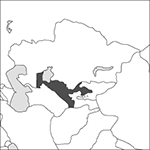
Source: MAPS IN MINUTES™ © RH Publications (1997)
Capital:
Tashkent
Area:
447,400 sq km (172,741 sq miles)
Population:
28,661,637 (2013 est)
Currency:
1 som = 100 tiyins
Religions:
Muslim 88.0%; Eastern Orthodox 9.0%
Ethnic Groups:
Uzbek 80.0%; Russian 5.5%; Tajik 5.0%; minority groups
Languages:
Uzbek (official); Russian; Tajik; minority languages
International Organizations:
UN; Commonwealth of Independent States; OSCE; Euro-Atlantic Partnership Council; WTO
A country in central Asia situated south of Kazakhstan; to the south and east are Turkmenistan, Afghanistan, Tajikistan, and Kyrgyzstan.
Physical
Uzbekistan extends south-east from the deserts of the Aral Sea to the Alai Mountains on the border with Afghanistan. At the foot of these lie the fertile Fergana valley and several large oases. The Amu Darya (Oxus) flows north-west to the Aral Sea, providing a second fertile belt, between the Kara Kum sand desert and the Kyzyl Kum desert of stony clay.
Economy
Uzbekistan’s principal mineral resources are natural gas, petroleum, coal, gold, uranium, and metal ores. Natural gas and other energy products are the principal exports; cotton and gold are also significant. Agriculture is dominated by cotton, of which Uzbekistan is the world’s sixth-largest producer. Industries include textiles, food processing, machine building, vehicle manufacture, metallurgy, and mining. Unlike most other former Soviet republics, Uzbekistan’s economy remains centrally planned.
History
Uzbekistan was the centre of the empire of Genghis Khan, and its two ancient cities of Samarkand and Tashkent flourished with the silk caravan trade. Divided into three khanates, Bukhara, Khiva, and Kokand, it was repeatedly attacked by Russia from 1717 until its annexation in 1876. Its Sunni Muslim Uzbeks were excluded from office by the Russians, and in 1918 staged a rebellion. This was suppressed by the Red Army, and a Soviet Socialist Republic was formed in 1929, which joined the Soviet Union in 1936. After 1989 the republic pressed for independence. The former Communist Party of Uzbekistan, renamed the People’s Democratic Party, retained power in the country’s parliament following elections in 1990. Uzbekistan declared independence from the Soviet Union in August 1991 with Islam Karimov, the former Communist leader, as President—a position he retained in all subsequent elections (2000, 2007, and 2015) until his death. Uzbekistan joined the Commonwealth of Independent States in 1991, but dissatisfaction at Russian dominance of this body led Uzbekistan to form an alternative economic union with Kazakhstan and Kyrgyzstan in 1994. Opponents of the ruling regime have become increasingly violent, and in the 21st century President Karimov’s regime came under increasing international criticism for violations of human rights. Following Karimov’s death in 2016 he was succeeded by his former Prime Minister, Shavkat Mirziyoyev, who gained 89 per cent of the vote in a 2017 election.
- al-Razi, Fakhr Al-Din
- al-Razi, Fakhr Al-Din (1149–1209)
- Alrescha
- ALSA
- al Sabziwari, Al-Hajj Mula Hadi (8–1873)
- ALSEP
- Alshain
- al-Sijistani, Abu Sulaiyman Muhammad
- al-Sijistani, Abu Sulaiyman Muhammad (c.932–c.1000)
- als ob
- Altair
- altazimuth mounting
- alteration
- alteration halo
- alter ego
- alterity
- alternant
- alternate angles
- alternating current
- alternating-current generator
- alternating-current motor
- alternating-current resistance
- alternating-current transmission
- alternating function
- alternating group